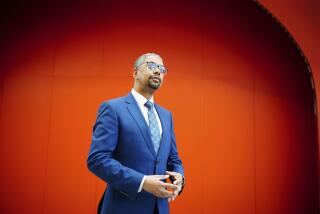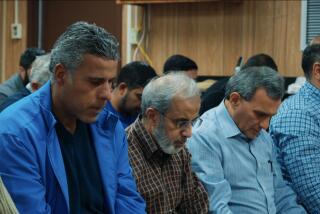Integration a Problem : Muslims in Britain: No Small Clout
- Share via
BRADFORD, England — In May of last year, this city of aging textile mills and conservative values elected Britain’s first Muslim lord mayor.
He is Mohammad Ajeeb, a Pakistani immigrant, and he was chosen for the ceremonial post by his fellow city councilmen. He said at the time that it was the greatest honor of his life.
Bradford’s 60,000 Muslims were proud. The Yorkshire gentry shed their shoes at the entrance to the local mosque with the mixture of curiosity and stoic dignity that well-bred Englishmen often adopt in the face of the unfamiliar.
“I was a reminder of a changing society,” Ajeeb said not long ago in an interview.
So was the hate mail that he received, and the rocks hurled through the front window of his home.
Simmering Hatreds
Ajeeb’s year as mayor of Britain’s sixth largest metropolitan district--the bridges that he built between the city’s communities and the simmering hatreds that his election exposed--symbolizes Britain’s hopes and perils as it faces up to an unsettling truth: This once-homogeneous island nation has become, in the space of two decades, a permanently multiracial society.
None of Britain’s new minorities have exerted greater influence over time-honored traditions and basic values than the growing Muslim community, today estimated to number well over 1 million.
Although barely 2% of Britain’s 55 million people, the Muslims, who come mainly from South Asia, the Middle East and West Africa, have tended to cluster in the large cities of the industrial north and Midlands, where they constitute an increasingingly powerful force for change.
In Bradford and other industrial centers like Birmingham, Nottingham and Leicester, their presence has altered the fabric of traditional British life. Social scientists believe further change is inevitable.
Standing of the Church
When the Church of England recently published a report on inner-city areas, some Britons wondered whether the church still had much standing in those areas.
“It doesn’t mean that the Church of England can’t speak on the problems, but it does mean that the opinions of Muslims or other non-Christian faiths are equally valid on the subject,” Nicholas Deakin, a professor of social administration at Birmingham University, told a reporter.
Through persistent, low-key pressure rather than open agitation, the growing Muslim population has brought minarets to the British cityscape, the traditional halal, or ritually slaughtered, meat to the school menu and disquiet to the many who see English values as being threatened.
Muslim leaders talk today of lobbying Parliament for recognition of their religious holidays and for substantive changes in the laws governing domestic life.
Jorgen S. Nielsen, a lecturer at the Center for the Study of Islam and Christian-Muslim Relations, an adjunct of the Selly Oak Colleges in Birmingham, told an interviewer, “What is happening challenges all the old ideas of what it means to be British.”
Other minority groups have also exerted pressure for change. In a black community of predominantly West Indian origins, this pressure has occasionally exploded onto the streets in serious rioting, while other, smaller minorities, such as Sikhs have coalesced to confront authorities on certain specific issues.
But none of these groups have confronted the basics of English life or achieved greater visible change than the Muslim community. Among developments in recent years:
--In several cities, including Bradford, churches have been sold and renovated to serve Muslim congregations. The minarets of big new mosques can be seen from the River Clyde in Glasgow to Regent’s Park in London.
--After six months of monitoring noise levels, environmental officials in Birmingham recently ruled that the city’s central mosque could continue to issue its twice-daily call to prayer despite complaints from worshipers at a nearby Anglican church. In Islamic countries, the muezzins call the faithful to prayer five times a day but in Britain, except in Birmingham, Muslim communities have not sought permission to make the summons by loudspeaker.
--After a bitter clash between Muslim parents and British animal lovers in 1984, state-run school cafeterias in Bradford began offering meat from animals slaughtered according to Muslim practice, by slitting the throat.
Several other urban school districts now offer halal meat, but the battle is far from over. The other day an organization known as Compassion in World Farming described the ritual slaughter as “a cruel and savage custom” and pledged to press the government to ban the practice. Animal lovers have gathered unsolicited support from right-wing groups such as the National Front.
--In Blackburn, a court ordered a chain of retail shops, the British Homes Stores, to hire an 18-year-old Pakistani Muslim woman whom it had rejected because she found the knee-length dress that is the chain’s uniform too immodest and refused to wear it. The issue of religiously appropriate dress has also come up in the schools. Muslim parents have balked at rules requiring their daughters to wear the relatively tight-fitting garments worn by generations of English schoolgirls.
--In a debate similar to the U.S. controversy over prayer in school, Muslim parents in many areas have challenged the legitimacy of morning assembly in state schools. This is a time set aside by law for Christian religious instruction.
“Teaching a Muslim child how to sing ‘Onward Christian Soldiers’ is slightly incongruous,” Graham Mahoney, who monitors Bradford’s municipal race relations program, said in a recent interview.
Scrapping the assemblies would be illegal, and it would fuel resentment among Christian parents, but education officials argue that excusing Muslims from the activity could harm the sense of community that the schools hope to achieve.
Already, education authorities in several large cities have been forced to review or alter policies because of pressures from Muslim parents:
--In Birmingham, for example, a plan to close an all-girls school and integrate students in nearby co-educational facilities was reversed after Muslim community leaders conveyed the importance of single-sex education for Muslim girls.
--In the London borough of Brent, the civic leaders have endorsed the application of a Muslim religious school for central government assistance. If the Department of Education approves the assistance, the school would become the first central government-funded Muslim school, joining more than 4,000 religious-based private schools run by the Catholic, Anglican and Jewish faiths.
Islam and Britain are certainly no strangers. In its day, the British Empire embraced well over 100 million Muslims in Asia and Africa. The first mosque in the British Isles dates back to the 1890s.
Desperate Bid
The vast majority of Britain’s Muslims trace their roots to former colonial possessions that have become independent countries--Pakistan, Bangladesh, India, Nigeria. What had been in the late 1950s a trickle of immigrants became a flood in the 1960s, as British wool and cotton mill owners imported cheap labor in a final, desperate bid to remain competitive in the world marketplace.
Today, many of those mills and most of the jobs are gone, but the workers and their families are still here. For most of those people, home is now Britain, and Britain is trying to adjust to this fact.
At first, local government and school authorities tried a policy of assimilation similar to that which helped the cities absorb waves of immigrants from Poland, the Ukraine and the Baltic states between the two World Wars.
Minority children were bused to suburban areas, in order to keep whites in the majority, and no allowance was made in the classroom for cultural differences. But assimilation failed, due partly to Muslim community resistance, and it has been replaced with what local race relations officials refer to as a multicultural approach. Now courses are offered in Asian languages; there are multilingual libraries and ethnic food and clothing.
The change has satisfied Muslims but angered others, who are quick to recall that East Europeans integrated well.
‘Doesn’t Understand’
“The desire to retain their culture, so strong among the (Muslims), is threatening,” Terry Quinn, editor of the Telegraph and Argus, Bradford’s largest newspaper, told a visitor. “It comes through on our letters pages that the community doesn’t really understand why it must adapt so much for them.”
Former Lord Mayor Ajeeb, like many of Britain’s Muslims, expressed frustration at official insensitivity to minority needs.
“Considering this country’s imperial history, it’s amazing how little people have learned about the subject,” he said in an interview. “This is an island country which has never been invaded and has no experience of people who are alien in their race, their culture and their religion.”
In his year as lord mayor, Ajeeb presided over extremes of race relations in the city. A fire that swept through the grandstand of the Bradford City professional soccer club, killing 56 people and injuring 300 others, united the city in grief shortly after Ajeeb took over.
But within a few months, the city was polarized as never before by the stand that a local junior high school headmaster, Ray Honeyford, took against the policy of multicultural education.
The bespectacled, 51-year-old Honeyford believed that anything less than a traditional English education cheats all the students. Because his students were 90% Muslims, his stand drew parental anger as well as national attention. The question of minorities at his school was the same problem that Britain faced as a nation: assimilation or cultural coexistence.
Avalanche of Hate Mail
Ajeeb’s stand against Honeyford brought him an avalanche of hate mail, threats to his family and rocks through the windows of his home. Honeyford was suspended but then reinstated, and finally paid to leave town.
The town has yet to recover from the tumult of Honeyford’s stand. And as the children of first-generation Muslim immigrants reach maturity, social scientists predict that the tension could quickly intensify.
Members of this new generation have little of their parents’ docility. They see themselves as British, the equal of their Anglo-Saxon counterparts. But in the large northern cities young members of minority groups find it much more difficult than whites to find work.
Muslim community leaders talk of more change to come, including official holidays for Islamic festivals and recognition of Islamic domestic laws, including those governing marriage, divorce and inheritance.
‘Right to Follow’
Syed Pasha, general secretary of a coalition of groups called the Union of Muslim Organizations, said, “As Muslims, we have the right to follow our own traditions.”
Meanwhile, hostility is increasing among young urban whites. Many of them see the large immigrant population as a cause of high unemployment and strained public services.
“Race problems have to be discussed informally and candidly,” Ajeeb said, but he noted that no progress is possible without a consensus.
“We must keep working together,” he said. “Without taking the whites with us, no race relations policy can succeed.”
More to Read
Sign up for Essential California
The most important California stories and recommendations in your inbox every morning.
You may occasionally receive promotional content from the Los Angeles Times.













